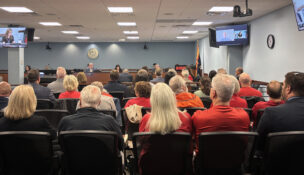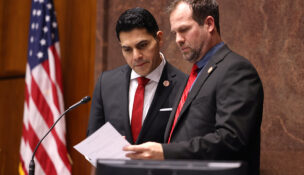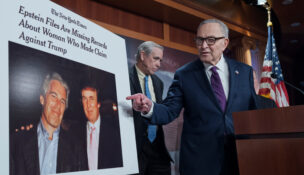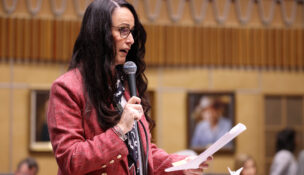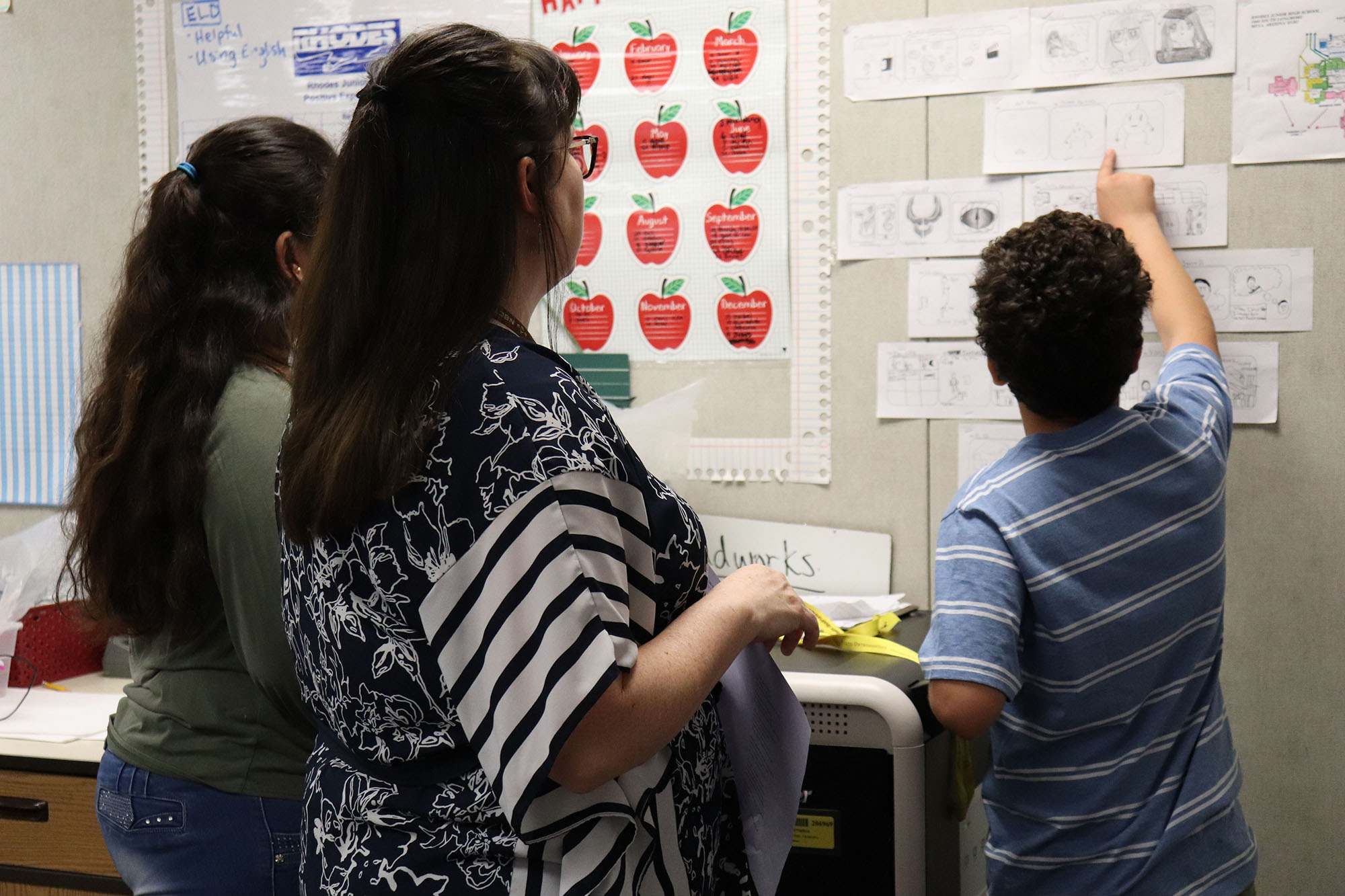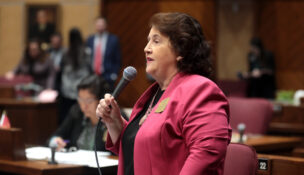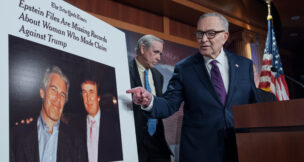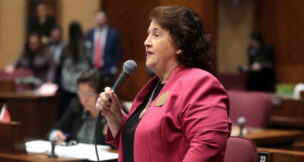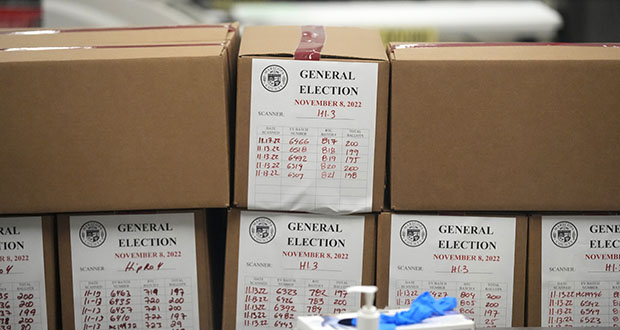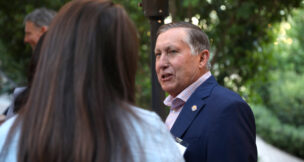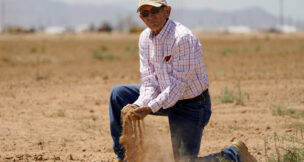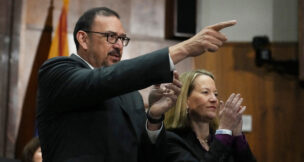Andrew Gould – a history student looking out for the little guy
Kiera Riley Arizona Capitol Times//September 13, 2024//
Andrew Gould – a history student looking out for the little guy
Kiera Riley Arizona Capitol Times//September 13, 2024//
As an attorney turned trial court judge, appellate judge, Arizona Supreme Court justice and attorney once more, Andrew Gould has seen all stripes of the law. In a recent interview with the Arizona Capitol Times, Gould shares how his perspective on law evolved from both sides of the bench.
The questions and answers have been edited lightly for style and clarity.
What led you to the law?
I’ve always been a student of history. And when you look at this country in particular, the law is so important. From the Constitution all the way down to our statutes and our court decisions. … I know it sounds trite, but it really is a nation of laws … so I always wanted to be involved in, not politics, but I always wanted to be involved in public service, and making the country better. … A lot of what I do is constitutional law. And with constitutional law, you have to love history, too. … Studying the Constitution and being a constitutional lawyer goes hand in glove with my love of history.
There is another side to this. My family had some tough times growing up. There were ups and there were downs, but there were some very, very bad times. I always wished that there was somebody when I was growing up who would fight for people like my mom and dad, people who didn’t have any money, they didn’t have any influence. There wasn’t anybody to fight for them. I thought someday I’d like to be able to fight for people like my mom and dad. So that’s the human side of it.
Where did your love of history start? Where do you trace that back to?
I’ve always loved to read. … When you dig into history, you look at these people who faced real problems that were uncertain. It took extraordinary effort and courage and leadership to take people through those tough times. … I think the takeaway is there are really no new problems. It’s part of the human condition, and we’ve had to overcome them before and address them. Sometimes we’ve failed. So I think it helps you to try to face problems that we look at now to see how they were addressed before. I just love it. All I do is read history books. … It’s fascinating to read about real people, real things, the problems they face and relate to my own situation and times that I live in now.
Can you think of any books you’ve read recently that have been particularly resonant or applicable?
I read a book on Oliver Cromwell recently. … Here’s a man who was just sort of a country farmer, they brought him in during the English Revolution. He became a leader, then a general, and one of the greatest ever. And he was in his forties when he did it. And so when you think about that, forty would be like being in your fifties or sixties now. The reason why I thought it was interesting was it was amazing the capabilities that people have that they don’t know, how they can blossom into something extraordinary. A man with no military history, well into middle age at that time becomes the greatest general of his time. … Of course, it was encouraging to me as I’m in middle age. Gosh, you know, there’s a lot of things you can do.
What cases stick out in your mind as either defining moments in your career, or interesting or memorable cases.
I can kind of work backward. On the Supreme Court, one of the toughest cases I ever did was the Brush and Nib case. That was dealing with free speech and compelled speech, and so that was a big case, and it was a lot of analysis that went into that.
As a trial judge. Wow, there’s so many cases. I remember one case. It was actually a medical malpractice case with a little boy who got viral meningitis, but it wasn’t properly diagnosed up front. And by the time they were able to diagnose it, it had basically destroyed most of his brain. And so he went from this vibrant little boy who loved to play soccer to unable to speak and had to wear a diaper and 30, 40, 50-60 seizures every day for the rest of his life. He had these wonderful grandparents that cared for him, and they brought him into court one day. And the little guy came in with those little crutches, and he had a helmet on because he would hit his head. And I’ve never seen a jury — I’ve done murder cases, child molestation cases. I’ve seen them all, most gruesome murders, the most horrific molestation, rapes. I’ve seen all those cases — but I’ve never seen an entire jury weep. The entire jury was weeping. It was so tragic. I remember that case very well.
How did you decide to make the move to the bench, and could you briefly walk me through your ascent?
I don’t know about that. I think things just happen in life, and then you’re either ready for it or not. I didn’t come from a family of any influence whatsoever. I had no connections. No one had been a lawyer in my family. I didn’t have any of that. I graduated from law school, and I had some friends who had clerked here in Phoenix, and they said Phoenix is a great place for a young person to go, a lot of opportunity. It’s just a new city. It’s growing. And so I came down here and I got a job, and I worked at Snell and Wilmer. It was my first job, and then I later worked at Gallagher and Kennedy. But I really always wanted to be a prosecutor. I wanted to do trial work, and I just wanted to fight for justice. I liked those jobs, but I just wanted something more. So I interviewed around, but the job that came open was in Yuma, and at the time, I thought, no way. But my wife is from a small town. She said, “Let’s try it.” And we loved it, and it was great. And then an opening occurred on the bench. I had no intention of ever being a judge. That wasn’t the thing I went to law school for, but the judge who was retiring, I respected him a lot, and at one point, while the position was open, he came off the bench, and I ran into him, and he said, “Are you applying?” And I said, “No, Judge, I’m not.” And he didn’t ask me to apply. That’s not what he said. He said, “Well, we need good people to apply because they owe it to their community to help.” I thought, were you talking to me? You know, to this day, I don’t know if he was talking to me. I think he was. I went home and told my wife, and she said, “You should apply.” And so I applied, and I got it.
I was on that trial bench for 11 years, and I became the presiding judge. And then I thought, the more I do this, I’d like to be writing these decisions. So then I started applying to the Court of Appeals. And then when I was on the Court of Appeals, I thought, This is great, but the final word here in this state is that Supreme Court, and I’d like to have a say …. And so I applied, and eventually got there.
How has your life experience and work experience shaped how you look at cases now?
As a young man, the experiences my family had – because there were times when we were very poor – I felt like the system was against us. I believed in the system. My parents were very patriotic and hardworking people, but there’s times where it just felt like, for the average person, it just was against us, it grinds you. My dad, we were being evicted from an apartment we were living in, and I remember him going to court and just being destroyed on the stand, just destroyed. He’s a good guy. You remember those things. So, in terms of how it impacts me, everybody’s equal before the law. It has to be. We can’t have winners and losers.
Bearing Cromwell in mind, what are your goals for the future?
I’m always going to stay politically involved. I want to be involved in the future. I’ve got children and a grandson now, and I want to make sure that this country and this state is as great for them as it has been for me. So I’m very, very, you know, I’m at a point in life I could retire and I could, I would be just fine, but I’m worrying about the next generation and the generation after that.
What’s something the average person might not know about you?
I think people see me as very serious. And I just, I think if you ask the people who know me well, I do have a good sense of humor, but I know a lot of times people don’t see that. … I grew up in a family where, like I said, we didn’t have a lot, but we sure did have a lot of good laughs. I love to laugh.
What is a motto or ethos that guides you in your life and in your work?
If there were one that I would tell you – 99% of life is failure. It’s how you respond to it. So you’re going to fail at things. It’s just part of life. It’s how you respond to it.







